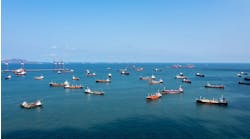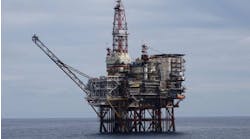HOUSTON, Apr. 3�Alaska Gov. Tony Knowles said Tuesday he expects the state legislature to pass a bill prohibiting construction of an offshore pipeline from Prudhoe Bay to Canada�s Mackenzie Delta.
Knowles said Alaskans want North Slope gas transported to the Lower 48 States through a pipeline across Alaska. He did not say whether he would sign such legislation.
Speaking with reporters at the Ziff Energy Group North American Gas Strategies Conference in Houston, Knowles said Senate Bill 164 has overwhelming support in that body. He also expected the Alaska House will approve the measure.
The bill would prohibit rights-of-way for a gas line on state-owned submerged land in the Beaufort Sea, effectively blocking a potential pipeline from Prudhoe Bay field to the Mackenzie Delta and connecting with a proposed Mackenzie Valley pipeline.
�As a law, it has questionable value, but as a sentiment, it has to be dealt with. I think it sends an important message,� Knowles said of Bill 164. �It does reflect an intense feelings Alaskans have that they need to have access to a resource that is from Alaska.�
Knowles also said environmental concerns would likely block an offshore pipeline anyway.
Pat Duncan, Yukon Territory Premier, said, �If this bill becomes law, I doubt this (offshore) route will remain an option.� Both Knowles and Duncan said they believe the market could support two pipelines, one in Alaska and one in Canada.
A pipeline following the Alaska Highway route would parallel the Trans-Alaska Pipeline System from Prudhoe Bay to Fairbanks, and then the Alaska highway from Fairbanks to pipeline connections near Fort St. John, BC (OGJ, Aug. 7, 2000, p. 68).
Northwest Territories Premier Stephen Kakfwi advocated a Mackenzie Valley pipeline route for moving as-yet-untapped gas reserves from the Northwest Territories to market. He said the Mackenzie Valley pipeline route could be a stand-alone project or it also could transport Alaskan gas.
�The Alaska Highway route and the Mackenzie Valley route are both feasible and both should be built. The market justifies it,� Knowles said.
Where, when, and if a pipeline to tap Arctic natural gas reserves for southern markets would be built has been a subject of debate for years.
Recent high gas prices and a US gas demand forecast of 30 tcf/year by 2010 are driving new interest in tapping reserves in Canada�s Mackenzie Delta and Beaufort Sea and the estimated 35 tcf of proved gas reserves on Alaska�s North Slope.
Kevin Meyers, president and CEO of Phillips Alaska Inc., said a producers' group is studying all possible options for transporting gas, and that he hoped a decision on a route will be reached by the end of the year with the first gas to be shipped possibly as early as 2007.
�We�re not dropping that route evaluation,� Meyers said of the Beaufort Sea link. �But the (Prudhoe Bay) fields are all on state land, so you would have to have some sort of state right-of-way. We haven�t made a pipeline decision yet.�
Kakfwi said Bill 164 �doesn�t worry me.� He added, �It just astounds me.� This peremptory move by Alaska state legislators may serve to price Alaskan gas producers out of the market by forcing them to use a more expensive route to get their product to market,� Kakfwi said. �It is a move that is contrary to the spirit of a continental energy policy and shows no regard for the public who will pay the higher price.�
Kakfwi said studies of the Mackenzie option have shown the route is flatter, shorter, environmentally friendlier, and the least costly of any alternative.
Tony Fountain, president of BP Energy Co.�s North America gas and power unit, said the Alaskan Highway route would cost more than $10 billion.
Paul H. Ziff, CEO of Ziff Energy Group, estimated the Alaska Highway pipeline, the Mackenzie Valley line, and related pipeline connections to transport the gas from Alberta and into the US would cost $20 billion.


